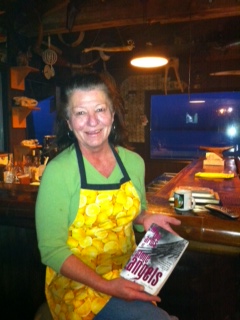By Jordan Dane
@JordanDane
Sorry for the delay in posting. I just got back from the trip from traveler’s hell. I had a speaking gig in the beautiful Madison, Wisconsin, but the weather on departure day resulted in our flight being cancelled. It took us two days to get back. I felt like I was in a John Candy & Steve Martin movie, without the trains.
For this post, I wanted to share my recent experiences with creating an audio book for my YA debut, In the Arms of Stone Angels. My publisher omitted audio rights from my contract, which gave me an opportunity to try Audiobook Creation Exchange (ACX), a site from Audible that I learned about through the International Thriller Writers (ITW). Others using ACX are: Neil Gaiman, M. J. Rose, award winning voice talent Tavia Gilbert, Tantor Audio, and Random House (a key ACX launch partner). ANY narrator with a home studio (or access to a studio) can be listed as a voice actor and audition for work.
ACX provides a central location where authors, publishers, agents, narrators, studio producers, and other rights holders can match up projects to create an audiobook for distribution through Audible (and elsewhere) under two different royalty models.
Parties can create a profile of the project for others to see. Narrators can audition, audiobook publishers can express interest, producers can make offers, and rights holders don’t have to let their rights languish. Setting up a profile is easy. I started the project in July and listed my book. Within a short while I had narrators auditioning, but I waited to see if I could get an audiobook publisher or producer interested, since I had no experience with this.
Narrators can be their own producers. I could have been more aggressive about seeking narrators and sending them a message through ACX, but I waited to see what would happen. In October, Audible added a stipend incentive to my project, meaning they offered to subsidize a producer to create my book by giving them $150/finished hour (up to $2500) for a 10-hour completed project. This stipend flag brought more auditions and producers to my project. The stipend had a deadline so Audible could get my book by year end for the holidays.
Once I decided to be more proactive in pushing my project, I decided on a narrator who had experience, awards, and a solid producer to go along with her voice actor talent. The steps from there are all online. I extended the offer, based on a royalty sharing model with my narrator, so I wouldn’t have to shell out money. The Audible stipend helped entice the narrator and producer I chose. Royalty rates will vary depending upon whether you give Audible exclusive or no-exclusive distribution rights. You decide how this can work and set it up. For more details on how ACX works, click HERE. For FAQ, click HERE.
Once I extended the offer and the deadlines ACX wanted for the stipend, I got a standard agreement printed through ACX between the parties, and my narrator had her deadline for acceptance (up to 72 hours). I talked with my narrator on the phone to share my thoughts on my central character, to help her create the voice of my teen girl, sent my book in PDF for her to read, and a 15-minute narration came within 5 days for my approval. In 60 days, I will have a finished audiobook to approve, but Audible will also act as a quality control checkpoint. If you opt for Audible to be your distributor, your book will be set up for distribution through Audible, Amazon, and iTunes. If you don’t give Audible exclusivity, you can distribute your audiobook anywhere you want to go.
I’m very excited to “hear” the voice of Brenna Nash, my character, through my award-winning narrator, Michelle Ann Dunphy. ACX has been very easy to use and I like the control aspects I keep with this project. I’m working with my German cover designer to develop the audiobook cover now. ACX is self-publishing for audio.
If you’re an author, do you retain your audio rights? How many of you like to listen to audiobooks? I love them for long road trips and for camping, listening to a story over a blazing fire.
Category Archives: In the Arms of Stone Angels
The Care & Feeding of Authors
Book Trailers and Our Visual Society
I got a Droid phone for Christmas and went from practically the Stone Age into a vision of an amazing future. I can scan barcodes and shop for the best price in town, use my GPS to find the latest trendy restaurant available by voice command, and even read books off my phone using a kindle download app for free. But the reason I’m blogging about my phone and the latest book trailer I had made for my first Young Adult book – In the Arms of Stone Angels (Harlequin Teen, Apr 2011) – is a cool app that I want to share with you.
A QR code looks like a Rorschach test. It is square and you may have seen them on pages of magazines, on signs, busses, business cards, etc. It works like a barcode and can be scanned like the stores ID their inventory at cash registers, but this code can be made by ANYONE using the hyperlink I posted above. It can be scanned via smart phone, like the Droid, with the right reader app. You can insert a secret message in text, insert contact information, or it can make a connection to a wireless network or link to a web page that opens on the phone’s browser. You can make the QR image play the part of a secret code made available only to winners in a contest or the code can direct a reader to your latest book trailer. Instant gratification for our visual society and a cool app toy!

This QR Code can be downloaded into a jpeg file that can be printed onto your latest bookmarks or made into stickers, whatever floats your boat. Anyone with a smart phone and a QR Code scanner can read your message. And in one swipe off your bookmark (or any other promotional material), a reader can be looking at your trailer in an instant. How cool is that?!
My contact at “Trailer to the Stars,” Misty Taggert, gave me the heads up on this app. It’s hard to quantify if book trailers actually sell books, but I sure love making them. And using a professional company like Misty and crew really made this effortless for me. I’m on deadline and they made the collaboration easy and simple, for my part. For them, not so much. I’ve done trailers myself before. It takes time and way more skill than I possess to do a trailer like this.
It’s hard enough to encapsulate your story into a short film of a minute and a half. But add a script, voice over talent, production music and action videos that fit, and movie animation effects for mood, and the process can get very complicated. And way above my paygrade.
For Discussion:
1.) What do you think of book trailers as a promotional tool? I was particularly interested in doing a trailer for YA. My target age for this book is 13-18 years old. And since Amazon and Barnes & Noble host trailers on an author’s book page, it’s great to have the opportunity to post a trailer at the point of sale.
2.) Have a great phone app to share? If you have a new phone and a great app to share, I’d love to hear about it. Hearing about new technology really stirs the creativity in me when I think of writing new books. Imagine an app that gives you Bluetooth capability, but also sends subliminal and subversive messages to your brain. Or picture an app that protects and backs up the contacts on your phone, in case it’s lost or stolen, but all the information for loved ones and friends (addresses, photos, phone numbers) make them a target for a dangerous predator unless you do exactly as they say. No one is safe. Anything can turn into a conspiracy with the right dose of paranoia.
3.) Want someone to indulge you? Hmmmmm, Basil? If you’re like the always inventive Basil Sands, you may want someone to invent an app just for YOU. What kind of phone app would that be?


